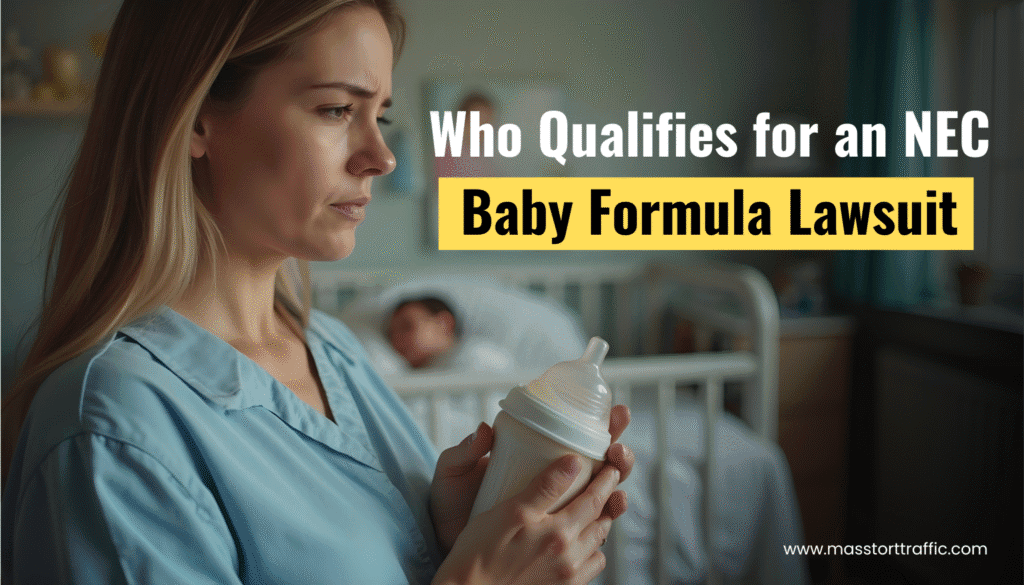Understanding NEC and Its Causes. Necrotizing enterocolitis (NEC) is a serious intestinal disease primarily affecting premature infants. NEC involves inflammation and cell death in the baby’s intestines, often leading to complications like infection or sepsis. Premature babies, especially those fed cow’s milk-based formula, face a much higher risk of developing NEC If your baby was diagnosed with NEC after using baby formula, you might wonder if your family qualifies for legal action. Understanding nec lawsuit qualifications can help you determine if you have a case.
For more on newborn feeding and health, see our Infant Health Guide. Families may also explore topics on parents’ legal rights and medical negligence for similar cases.

Table of Contents
Key NEC Lawsuit Qualifications
To be eligible for a baby formula NEC lawsuit, families generally must meet specific criteria. These include:
- Medical Diagnosis of NEC: The infant must have a confirmed NEC diagnosis in the medical records, documented by symptoms and imaging (like X-ray evidence). A documented NEC diagnosis is essential, as it establishes the injury needed for any claim.
- Prematurity or Low Birth Weight: Premature birth (usually before 37 weeks) or very low birth weight greatly increases NEC risk. To qualify, records like the birth summary must confirm the baby was preterm. Equally important are feeding records: hospital or NICU charts should show the infant was fed cow’s milk-based formula (such as Similac or Enfamil) after birth.
- Feeding History with Cow’s Milk Formula: The baby must have consumed a cow’s milk-based infant formula before developing NEC. This typically means formulas like Similac (by Abbott) or Enfamil (by Mead Johnson) were given. Documentation should show when and what brand was used.
- Absence of Exclusive Breastfeeding: Breast milk helps protect against NEC. If an infant received only breast milk, formula is less likely to be blamed. But if any formula (especially Similac or Enfamil) was given and NEC developed, that supports a formula link. Lawyers also check for other explanations (infections or complications); if none are evident, the formula is seen as the likely culprit.
- Lack of Other Causes: The case usually requires that no other obvious cause (such as a severe infection or anatomical defect) explains the NEC. In practice, this means formula feeding is the most plausible trigger.
- Medical Documentation: Thorough medical records are critical. Parents should collect all relevant hospital records: NICU charts and doctor reports confirming NEC, and detailed feeding logs showing whether the baby was fed breast milk or formula (and which brands). Also preserve any formula purchase or prescription records. If NEC required surgery or was fatal, surgical or autopsy reports provide key evidence. Complete, organized records strengthen the case by clearly showing the sequence of events.
- Statute of Limitations: Each state sets a deadline for filing lawsuits. NEC cases must be filed within the legal time limit (usually a few years after the injury or diagnosis). It’s vital to check this deadline so that a lawsuit can be filed in time.
Each of these qualifications helps determine if your situation meets the legal requirements to pursue a claim. Below, we break down the key criteria in more detail.
Diagnosis of NEC
For an NEC lawsuit, the baby’s medical records must clearly show a NEC diagnosis. Doctors diagnose NEC through symptoms (like feeding intolerance, abdominal swelling) and imaging (X-rays showing gas in the intestinal wall). You should have hospital documentation (NICU notes, imaging reports) confirming NEC. Without a formal diagnosis of NEC, there is no injury to link to the formula, so this diagnosis is a fundamental qualification.
Prematurity and Infant Feeding History. Premature birth (usually before 37 weeks) and low birth weight are the biggest risk factors for NEC. To meet the lawsuit criteria, medical records must confirm the baby was preterm (for example, a birth certificate or NICU summary noting gestational age). Equally important are the feeding records: the hospital or NICU charts should show that the baby was given cow’s milk-based formula (e.g. Similac or Enfamil) before developing NEC. Any formula orders, nursing notes, or feeding logs documenting formula use and brand are critical evidence.
Exclusive Breastfeeding and Other Factors
Breast milk is known to be protective against NEC. If an infant was fed only breast milk until falling ill, that may weaken a formula-based case. However, if any formula was introduced and NEC followed, that timing becomes significant. For example, if a premature baby received only Similac or Enfamil and then developed NEC, that strongly suggests a link. Lawyers will also review the baby’s health for other potential causes (like severe infection or oxygen deprivation at birth). If no other clear cause is evident, the fact that formula was used is emphasized.
Medical Documentation
Gathering documentation is one of the most critical steps. Parents should collect all relevant records: NICU and hospital charts confirming the NEC diagnosis, and detailed feeding logs showing exactly what milk or formula was given. Preserve formula invoices or prescription orders (to prove which brand was used). If NEC led to surgery (like a bowel resection) or, tragically, death, surgical reports and autopsy findings become key evidence. Organized, complete medical records make the strongest case by clearly showing when and why NEC occurred.
Who Can File an NEC Lawsuit?
Typically, the baby’s parents or legal guardians are the ones who file an NEC lawsuit. If the baby is alive and a minor, a parent files on the child’s behalf. If the baby unfortunately died from NEC, the parents or the child’s estate may file a wrongful death claim. In general, the child’s parent(s) have standing to sue. For example, if a parent is unavailable or deceased, another legal guardian or family representative might step in. Each case can be different, so an attorney will clarify exactly who should be named as the plaintiff. Understanding parents’ legal rights in health injury cases is important in determining who can act on behalf of the child.
Key Manufacturers and Allegations
The current NEC lawsuits focus on two major formula brands: Abbott’s Similac and Mead Johnson’s Enfamil. Families are suing these manufacturers under product liability laws, claiming the formula increased NEC risk without proper warnings. Key points include:
- Abbott Laboratories (Similac): Similac is Abbott’s popular cow’s milk-based infant formula. Premature babies fed Similac have been shown to have a much higher NEC risk than those fed breast milk. Plaintiffs claim Abbott knew of these risks and still failed to warn healthcare providers and parents about NEC.
- Mead Johnson (Enfamil): Enfamil is a formula brand by Mead Johnson (now part of Reckitt). Plaintiffs allege its preemie formulas carry a high NEC risk and that Mead Johnson did not properly warn. In a recent case, a jury found Mead Johnson negligent after a premature infant died of NEC following Enfamil feeding (resulting in a significant verdict for the family).
These claims are handled under product liability law, similar to other defective product cases. For more information on this area, see our article on product liability claims involving consumer products.
Consulting a Qualified NEC Lawsuit Attorney
A skilled attorney is crucial for NEC formula cases. An experienced medical negligence and product liability lawyer can help. They will review your baby’s medical records, consult pediatric experts, and prepare a strong claim. Attorneys know how to handle medical evidence, link it to the formula, and meet filing deadlines. Having legal expertise ensures you navigate this complex process correctly.
If your premature baby developed NEC after formula feeding, you may have a case. Visit our NEC Baby Formula Lawsuit page for a free case review. Our Team can explain your legal options and help determine your family’s eligibility.
Conclusion: Know Your NEC Lawsuit Qualifications
In summary, understanding nec lawsuit qualifications is the first step to protecting your child’s rights. Key factors include a documented NEC diagnosis, evidence of prematurity and formula feeding (with little or no breast milk), and no other clear causes of NEC. Proper medical records and timely filing are essential. Knowing these qualifications empowers parents to take the next step. If your situation meets these criteria, consider contacting a knowledgeable NEC lawsuit attorney for guidance.





